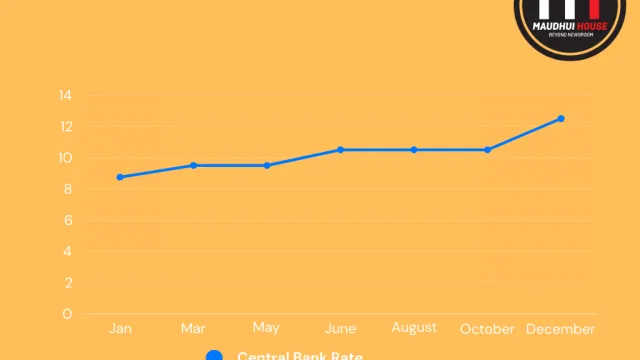CBK jumbo rate shows shilling has not yet hit its lowest point

CBK jumbo rate shows shilling has not yet hit its lowest point
The Central Bank of Kenya (CBK) has raised interest rates by 200 basis points to 12.5 percent, anticipating higher inflation due to the decline in the Kenya shilling. CBK Governor Dr. Kamau Thugge surprised the market, which had expected a pause on interest rate movements, especially as global attention shifted to the US Federal Reserve.
All eyes are on the US Fed's final meeting of the year on December 12-13. While projections may show an end to interest rate hikes, Fed officials are keen to avoid signaling a weakening commitment to 2 percent inflation or suggesting imminent cuts.
Amidst lingering uncertainties, CBK has taken a bold step in raising interest rates rapidly, despite seemingly modest inflation figures that dipped to 6.8 percent year-on-year in November from 6.9 percent in October.
Analysts suggest that this move signals CBK's anticipation of a further decline in the shilling over the next quarter, having already dropped 23 percent this year. This currency depreciation is expected to drive up prices, hinder foreign investment, and impact debt servicing on dollar loans.
Further currency dips
"It certainly was a surprise; we had anticipated a hold, so they are signaling they know something we do not know in the market and are either suggesting further currency dips or are moving to show the IMF they are serious about tackling inflation," commented Churchill Ogutu, Economist at IC Group.
The higher interest rates imply that borrowers will face challenges repaying loans, as interest rates soar, potentially leading to an increase in defaults. The government may soon encounter interest rates upwards of 20 percent on domestic loans, especially after recently borrowing 114 billion on an infrastructure bond at 17.9 percent.

The Kenyan shilling has depreciated from 123.4 units against the dollar to 153.2 this year, following Kenya's decision to allow the currency to devalue in accordance with the International Monetary Fund (IMF) program.
The Fund had insisted that the Jubilee government, led by Uhuru Kenyatta, and the Central Bank Governor, Dr. Patrick Njoroge, had attempted to artificially support the currency. After their departure, the IMF has urged President William Ruto to permit the shilling to 'find its value.'
Under the new government and the new CBK Governor, the decision was made to let the shilling devalue, citing the necessity to streamline the market, IMF restrictions on intervention, and a policy aimed at absorbing external shocks by enhancing export productivity.
However, the radical shift in policy under the new administration, involving spending on food importation subsidies, inconsistent decisions regarding the settlement of the Eurobond due in June next year, and an opaque multibillion-dollar oil trade deficit disguised as a Government-to-Government oil deal, has caused the shilling to fall beyond everyone's expectations.
Read Also: Bankers caught in the domino effect of the falling shilling
Fall of the shilling
Many had hoped that the shilling had finally found its floor when its monthly free fall slowed to one percent in November from 4.3 percent in March. However, now the CBK is signaling that the currency has yet to bottom out.
Dr. Thugge stated, "The risks to inflation are elevated in the near term, reflecting the impact of second-round effects of the rise in fuel inflation and pass-through effects of the exchange rate depreciation."
The gradual fall of the shilling, with transactions increasingly shifting towards dollar payments in Kenya across various sectors, has raised concerns about the intensifying trend toward the dollarization of the country's economy.



